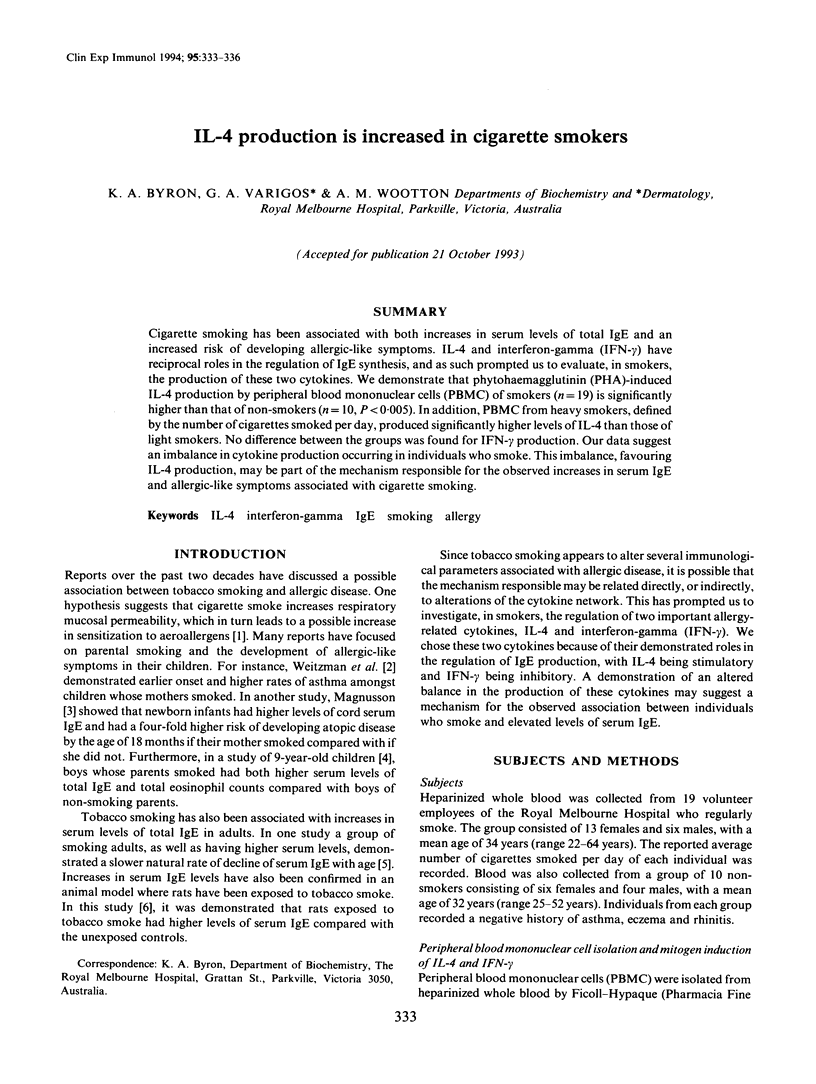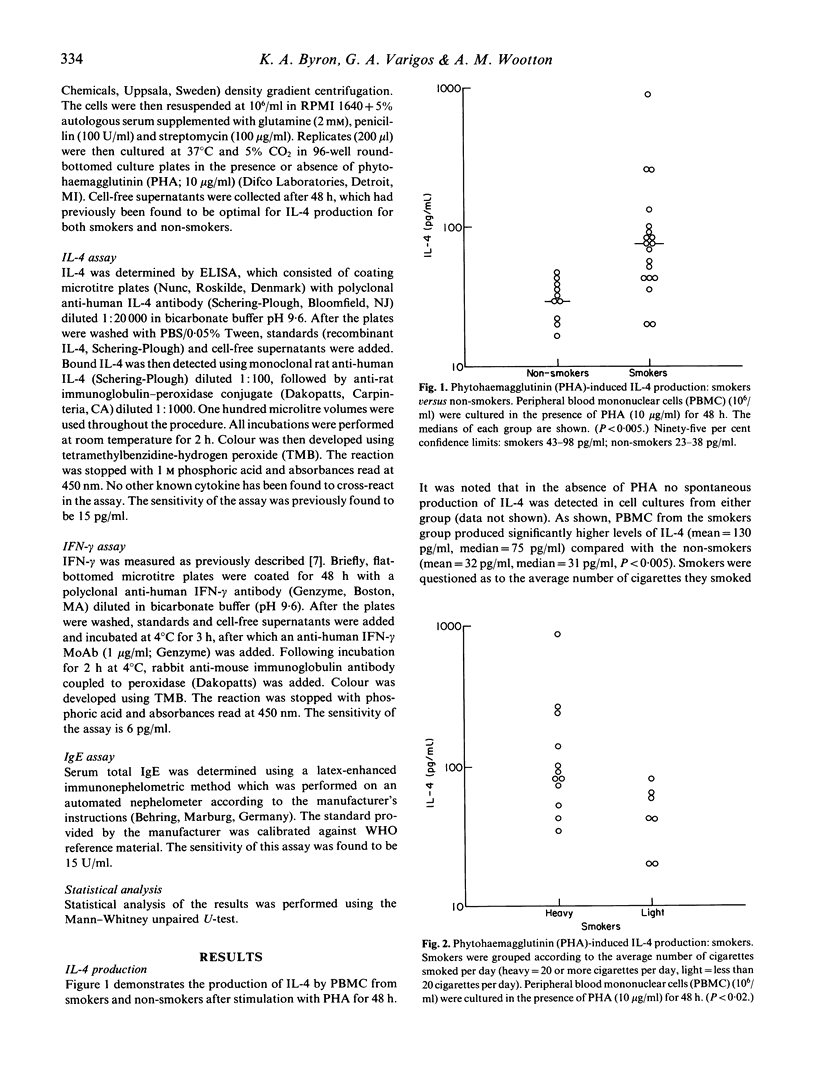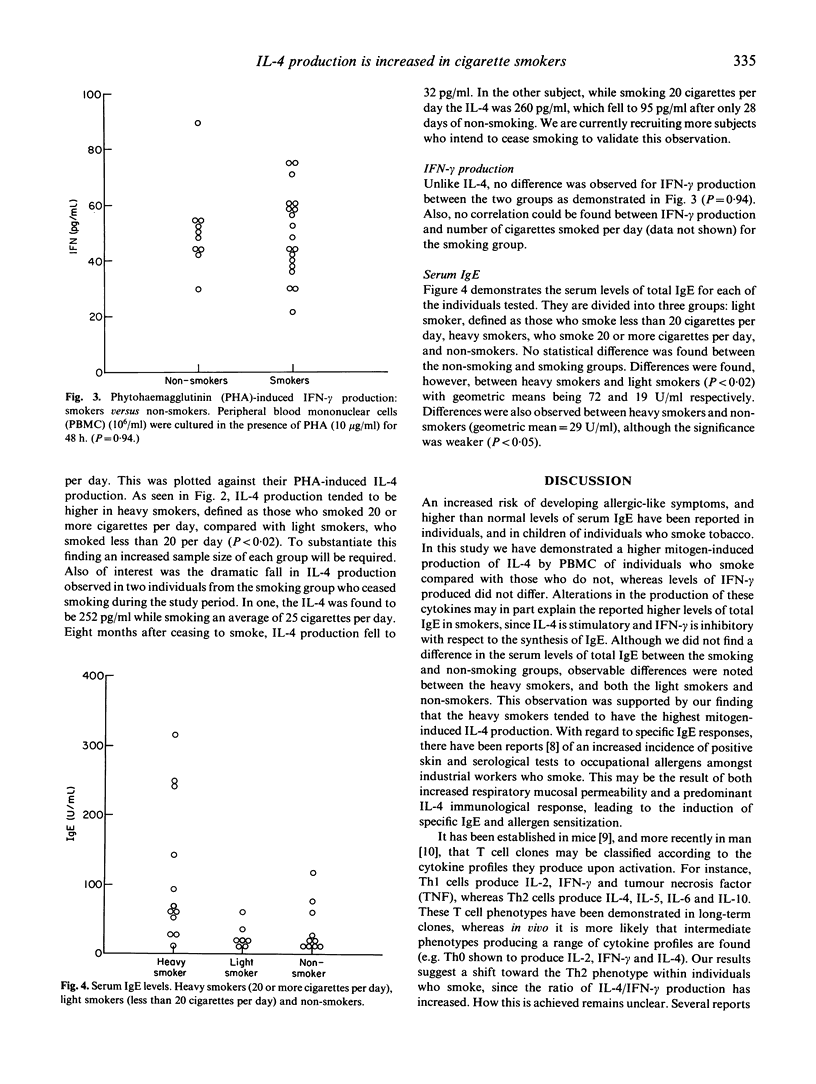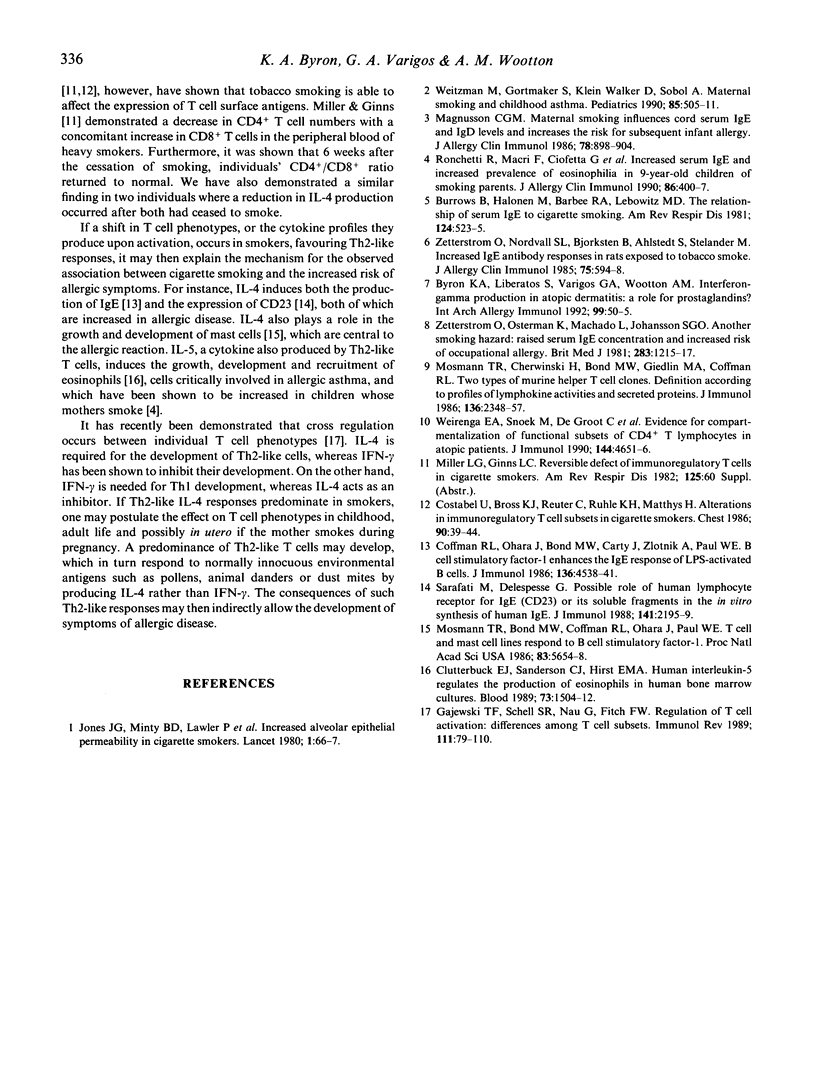Abstract
Cigarette smoking has been associated with both increases in serum levels of total IgE and an increased risk of developing allergic-like symptoms. IL-4 and interferon-gamma (IFN-gamma) have reciprocal roles in the regulation of IgE synthesis, and as such prompted us to evaluate, in smokers, the production of these two cytokines. We demonstrate that phytohaemagglutinin (PHA)-induced IL-4 production by peripheral blood mononuclear cells (PBMC) of smokers (n = 19) is significantly higher than that of non-smokers (n = 10, P < 0.005). In addition, PBMC from heavy smokers, defined by the number of cigarettes smoked per day, produced significantly higher levels of IL-4 than those of light smokers. No difference between the groups was found for IFN-gamma production. Our data suggest an imbalance in cytokine production occurring in individuals who smoke. This imbalance, favouring IL-4 production, may be part of the mechanism responsible for the observed increases in serum IgE and allergic-like symptoms associated with cigarette smoking.
Full text
PDF



Selected References
These references are in PubMed. This may not be the complete list of references from this article.
- Burrows B., Halonen M., Barbee R. A., Lebowitz M. D. The relationship of serum immunoglobulin E to cigarette smoking. Am Rev Respir Dis. 1981 Nov;124(5):523–525. doi: 10.1164/arrd.1981.124.5.523. [DOI] [PubMed] [Google Scholar]
- Byron K. A., Liberatos S., Varigos G. A., Wootton A. M. Interferon-gamma production in atopic dermatitis: a role for prostaglandins? Int Arch Allergy Immunol. 1992;99(1):50–55. doi: 10.1159/000236335. [DOI] [PubMed] [Google Scholar]
- Clutterbuck E. J., Hirst E. M., Sanderson C. J. Human interleukin-5 (IL-5) regulates the production of eosinophils in human bone marrow cultures: comparison and interaction with IL-1, IL-3, IL-6, and GMCSF. Blood. 1989 May 1;73(6):1504–1512. [PubMed] [Google Scholar]
- Coffman R. L., Ohara J., Bond M. W., Carty J., Zlotnik A., Paul W. E. B cell stimulatory factor-1 enhances the IgE response of lipopolysaccharide-activated B cells. J Immunol. 1986 Jun 15;136(12):4538–4541. [PubMed] [Google Scholar]
- Costabel U., Bross K. J., Reuter C., Rühle K. H., Matthys H. Alterations in immunoregulatory T-cell subsets in cigarette smokers. A phenotypic analysis of bronchoalveolar and blood lymphocytes. Chest. 1986 Jul;90(1):39–44. doi: 10.1378/chest.90.1.39. [DOI] [PubMed] [Google Scholar]
- Gajewski T. F., Schell S. R., Nau G., Fitch F. W. Regulation of T-cell activation: differences among T-cell subsets. Immunol Rev. 1989 Oct;111:79–110. doi: 10.1111/j.1600-065x.1989.tb00543.x. [DOI] [PubMed] [Google Scholar]
- Jones J. G., Minty B. D., Lawler P., Hulands G., Crawley J. C., Veall N. Increased alveolar epithelial permeability in cigarette smokers. Lancet. 1980 Jan 12;1(8159):66–68. doi: 10.1016/s0140-6736(80)90493-6. [DOI] [PubMed] [Google Scholar]
- Magnusson C. G. Maternal smoking influences cord serum IgE and IgD levels and increases the risk for subsequent infant allergy. J Allergy Clin Immunol. 1986 Nov;78(5 Pt 1):898–904. doi: 10.1016/0091-6749(86)90237-x. [DOI] [PubMed] [Google Scholar]
- Mosmann T. R., Bond M. W., Coffman R. L., Ohara J., Paul W. E. T-cell and mast cell lines respond to B-cell stimulatory factor 1. Proc Natl Acad Sci U S A. 1986 Aug;83(15):5654–5658. doi: 10.1073/pnas.83.15.5654. [DOI] [PMC free article] [PubMed] [Google Scholar]
- Mosmann T. R., Cherwinski H., Bond M. W., Giedlin M. A., Coffman R. L. Two types of murine helper T cell clone. I. Definition according to profiles of lymphokine activities and secreted proteins. J Immunol. 1986 Apr 1;136(7):2348–2357. [PubMed] [Google Scholar]
- Ronchetti R., Macri F., Ciofetta G., Indinnimeo L., Cutrera R., Bonci E., Antognoni G., Martinez F. D. Increased serum IgE and increased prevalence of eosinophilia in 9-year-old children of smoking parents. J Allergy Clin Immunol. 1990 Sep;86(3 Pt 1):400–407. doi: 10.1016/s0091-6749(05)80104-6. [DOI] [PubMed] [Google Scholar]
- Sarfati M., Delespesse G. Possible role of human lymphocyte receptor for IgE (CD23) or its soluble fragments in the in vitro synthesis of human IgE. J Immunol. 1988 Oct 1;141(7):2195–2199. [PubMed] [Google Scholar]
- Weitzman M., Gortmaker S., Walker D. K., Sobol A. Maternal smoking and childhood asthma. Pediatrics. 1990 Apr;85(4):505–511. [PubMed] [Google Scholar]
- Wierenga E. A., Snoek M., de Groot C., Chrétien I., Bos J. D., Jansen H. M., Kapsenberg M. L. Evidence for compartmentalization of functional subsets of CD2+ T lymphocytes in atopic patients. J Immunol. 1990 Jun 15;144(12):4651–4656. [PubMed] [Google Scholar]
- Zetterström O., Nordvall S. L., Björkstén B., Ahlstedt S., Stelander M. Increased IgE antibody responses in rats exposed to tobacco smoke. J Allergy Clin Immunol. 1985 May;75(5):594–598. doi: 10.1016/0091-6749(85)90035-1. [DOI] [PubMed] [Google Scholar]
- Zetterström O., Osterman K., Machado L., Johansson S. G. Another smoking hazard: raised serum IgE concentration and increased risk of occupational allergy. Br Med J (Clin Res Ed) 1981 Nov 7;283(6301):1215–1217. doi: 10.1136/bmj.283.6301.1215. [DOI] [PMC free article] [PubMed] [Google Scholar]


